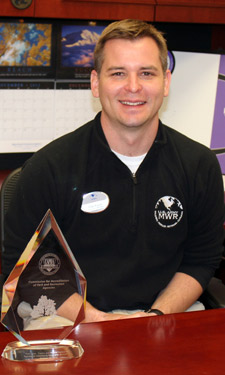 As community program coordinator for Fort Knox, Kentucky’s Family and Morale, Welfare, and Recreation services, Matt Enoch oversees sports, fitness, aquatics, recreation programs, and special events for the Army base, much like many of his fellow NRPA members who work for non-military communities. However, his career experience, spanning military, federal, state, and university recreation agencies, enables him to lead NRPA’s Armed Forces Network, and his expertise helps him provide the military viewpoint to the Commission for the Accreditation of Park and Recreation Agencies (CAPRA) and the National Certification Board. Although a civilian, Enoch is one of the most prominent supporters of military recreation and cheerfully contributes to several vital member experiences with NRPA.
As community program coordinator for Fort Knox, Kentucky’s Family and Morale, Welfare, and Recreation services, Matt Enoch oversees sports, fitness, aquatics, recreation programs, and special events for the Army base, much like many of his fellow NRPA members who work for non-military communities. However, his career experience, spanning military, federal, state, and university recreation agencies, enables him to lead NRPA’s Armed Forces Network, and his expertise helps him provide the military viewpoint to the Commission for the Accreditation of Park and Recreation Agencies (CAPRA) and the National Certification Board. Although a civilian, Enoch is one of the most prominent supporters of military recreation and cheerfully contributes to several vital member experiences with NRPA.
P&R: What are some of the challenges that come with working for a military department?
Matt Enoch: Actually, an Army installation is very much like an average city. What separates us from recreation departments “outside the gate” is our requirement to adapt programs and services to meet the needs of a very dynamic and transient community. When a significant portion of our population deploys for combat, we sharpen our focus on spouses and children who are left here without husbands, wives, mothers, or fathers. When soldiers come home, we shift our resources to address the multitude of challenges that face the returning warfighter. For example, our Warrior Adventure Quest program puts recently returned soldiers through high-adrenaline outdoor recreation programs. This helps meet the soldier’s need for excitement in a managed way and has proved to lessen the incidents of unsafe behavior soldiers engage in to get that “rush” they become used to while deployed.
P&R: When did you start volunteering with NRPA’s different committees and networks?
Enoch: I led Fort Knox through its initial CAPRA accreditation in 2007 and did the same at U.S. Army Garrison Hawaii in 2009. In 2010, I was fortunate to get the opportunity to serve as a CAPRA commissioner representing the Armed Forces Recreation Network (AFRN).
P&R: What changes do you think you may want to implement in your term of leadership for the Armed Forces Recreation Network?
Enoch: We must continue to identify the training and resources our military recreation professionals want and need, and deliver those in a manner consistent with new fiscal realities. We are going to have to serve our professionals where they are through media such as webinars and newsletters. Concurrently, we will be working hard to convince the leadership of our service branches that AFRN training is essential to a quality workforce and that travel and training funding should be provided for opportunities such as the annual Professional Training Institute.
P&R: What is your role with CAPRA and the National Certification Board?
Enoch: I bring the military perspective to CAPRA and NCB processes and standards, and I promote the benefits of both to leaders and field personnel with all service branches around the world. My charge is to get more military agencies accredited and more military recreation professionals certified. If I am successful, we will have better recreation personnel, programs, and services for our service members and their families.
P&R: What motivates your involvement with these different volunteer networks within NRPA?
Enoch: I feel very, very strongly about the power of recreation in benefiting people. I feel as strongly that those entrusted with providing recreation programs and services should be competent and professional. We (professionals in the field) need the NRPA and it needs us. I am willing and happy to serve our profession in any way I can.
Interview by Danielle Taylor, Associate Editor, Parks & Recreation.
Matt Enoch
January 1, 2013, Department, by Danielle Taylor

